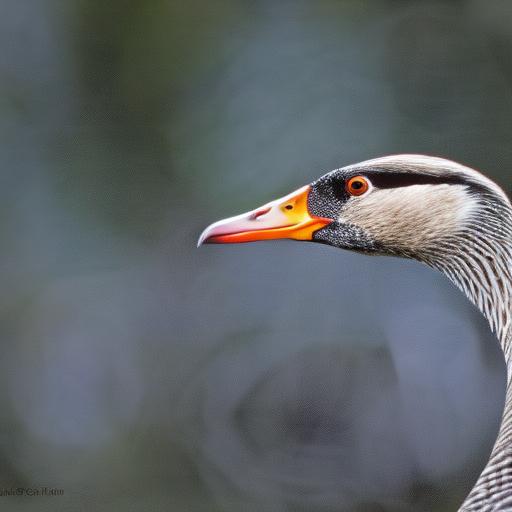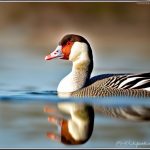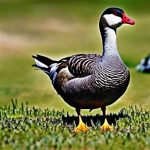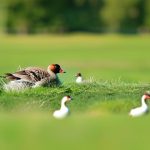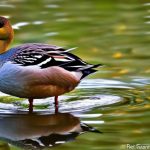Geese are a common sight in many residential areas, often causing problems for homeowners. They can leave behind droppings that are not only unsightly but can also pose health risks. Additionally, geese can damage lawns and gardens with their constant grazing. Understanding the behavior of wild geese is crucial in effectively deterring them from your yard. By implementing various strategies, homeowners can create an environment that is less attractive to geese, ultimately reducing the problems they cause.
Key Takeaways
- Wild geese are social animals that prefer to stay in groups and follow a leader.
- Geese are attracted to areas with open water, short grass, and easy access to food.
- Physical barriers such as fences, netting, or hedges can prevent geese from entering your yard.
- Decoys that resemble predators or other geese can deter geese from settling in your yard.
- Motion-activated sprinklers or noise makers can startle geese and discourage them from returning.
Understanding the behavior of wild geese
Geese are migratory birds, meaning they travel long distances between their breeding and wintering grounds. During the breeding season, geese establish nesting sites near bodies of water. They are highly protective of their nests and will aggressively defend them if they feel threatened. Geese communicate with each other through vocalizations and body language. By understanding their communication patterns, homeowners can use this knowledge to deter geese from their yards.
Identifying the areas in your yard that attract geese
Geese are attracted to open grassy areas and bodies of water. These areas provide ample food sources and a safe place for them to rest and raise their young. Homeowners should assess their yards for these types of areas and take steps to make them less attractive to geese. This may involve reducing the amount of open grassy space or installing barriers around bodies of water.
Implementing physical barriers to keep geese out
Physical barriers such as fences and netting can be effective in keeping geese out of certain areas of your yard. Fences should be at least three feet high and have small openings to prevent geese from squeezing through. Netting can be used to cover bodies of water or other areas where geese may be attracted. It is important to install these barriers in a way that is effective and aesthetically pleasing, as well as ensuring they do not pose a danger to other wildlife.
Using decoys to deter geese from entering your yard
Decoys can be an effective way to deter geese from entering your yard. Fake predators, such as coyotes or owls, can be placed in areas where geese are likely to gather. The presence of these decoys can make geese feel unsafe and encourage them to find a different location. Additionally, fake geese can be used to create the illusion of a larger flock, which may deter geese from landing in your yard.
Installing motion-activated sprinklers or noise makers
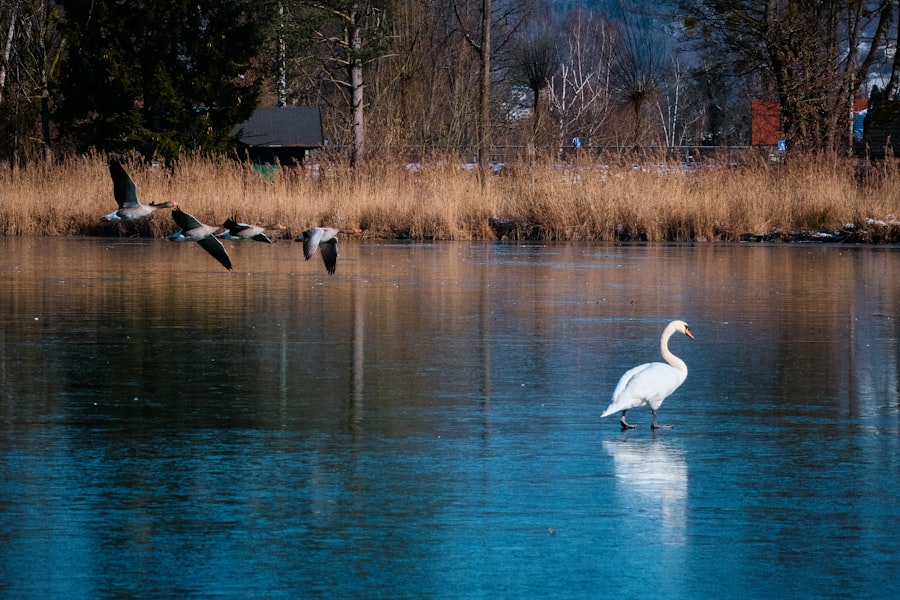
Motion-activated sprinklers or noise makers can startle geese and discourage them from entering your yard. These devices are triggered by the movement of the geese and emit a burst of water or loud noise. It is important to install these deterrents in a way that is effective and safe for other wildlife. They should be positioned strategically to cover the areas where geese are likely to gather.
Removing potential food sources for geese
Geese are attracted to grass and grains, so it is important to remove these food sources from your yard. Regularly mowing your lawn can help discourage geese from grazing on the grass. Additionally, removing any spilled birdseed or other grains can help reduce the attractiveness of your yard to geese.
Planting vegetation that geese dislike
There are certain types of vegetation that geese are less likely to eat. Planting prickly plants or those with strong odors can help deter geese from grazing on your lawn or garden. These plants include holly bushes, rose bushes, and lavender. It is important to plant these types of vegetation in a way that is effective and aesthetically pleasing.
Using repellent sprays or gels
Repellent sprays or gels can be applied to areas where geese are likely to gather. These products emit a scent that is unpleasant to geese, discouraging them from landing or grazing in your yard. It is important to use these repellents in a way that is effective and safe for other wildlife. Follow the instructions on the product carefully and avoid applying them near bodies of water or areas where other animals may be affected.
Building a pond or water feature that is less attractive to geese
If you have a pond or water feature in your yard, there are ways to make it less attractive to geese. Steep sides can make it difficult for geese to access the water, discouraging them from using it as a resting or feeding area. Additionally, adding floating islands or vegetation in the water can create obstacles that make it less appealing to geese.
Seeking professional help for persistent geese issues
In some cases, homeowners may need to seek professional help for persistent geese issues. This may be necessary if other deterrent methods have been unsuccessful or if the problem is particularly severe. When looking for a wildlife control professional, it is important to find someone who is reputable and experienced in dealing with geese. They can provide guidance and assistance in implementing effective deterrent strategies.
Geese can be a nuisance in residential areas, causing damage to lawns and gardens and leaving behind unsightly droppings. Understanding their behavior is key to effectively deterring them from your yard. By implementing physical barriers, using decoys, installing motion-activated sprinklers or noise makers, removing potential food sources, planting vegetation that geese dislike, using repellent sprays or gels, building less attractive water features, and seeking professional help when necessary, homeowners can create an environment that is less attractive to geese and reduce the problems they cause. It is important for homeowners to take action and implement these strategies to deter geese from their yards.
If you’re looking for ways to keep wild geese out of your yard, you might also be interested in learning how to create a secure and predator-proof chicken coop. Poultry Wizard offers a helpful article on farmhouse chicken coops that provides valuable tips and insights on building a coop that keeps your chickens safe from predators. Check out their article here to ensure your feathered friends are protected.
FAQs
What are some common problems caused by wild geese in yards?
Wild geese can cause damage to lawns, gardens, and landscaping by eating plants and grass, leaving droppings that can be difficult to clean up, and creating holes in the ground. They can also be aggressive towards humans and pets.
What are some effective ways to keep wild geese out of the yard?
Some effective ways to keep wild geese out of the yard include installing physical barriers such as fences or netting, using decoys or scare tactics such as loud noises or motion-activated sprinklers, and removing any food sources that may attract them.
Is it legal to harm or kill wild geese?
In most cases, it is illegal to harm or kill wild geese without a permit. However, there are some exceptions for situations where geese are causing significant damage or posing a threat to human health and safety.
What should I do if I encounter an injured or sick wild goose?
If you encounter an injured or sick wild goose, it is best to contact a local wildlife rehabilitation center or animal control agency for assistance. Attempting to handle or care for the goose yourself can be dangerous and may further harm the animal.
Are there any benefits to having wild geese in the yard?
While wild geese can cause problems in yards, they also play an important role in the ecosystem by helping to control insect populations and spreading seeds through their droppings. Additionally, many people enjoy watching and interacting with wild geese.
Meet Walter, the feathered-friend fanatic of Florida! Nestled in the sunshine state, Walter struts through life with his feathered companions, clucking his way to happiness. With a coop that’s fancier than a five-star hotel, he’s the Don Juan of the chicken world. When he’s not teaching his hens to do the cha-cha, you’ll find him in a heated debate with his prized rooster, Sir Clucks-a-Lot. Walter’s poultry passion is no yolk; he’s the sunny-side-up guy you never knew you needed in your flock of friends!

